For many CEOs and founders, taking their company to unicorn status might seem like a pipe dream. Now try to imagine having two unicorn SaaS companies under your belt. As someone who has achieved just that, Josh James, CEO and Founder of Domo, can teach us some of the things he learned the second time around. One thing’s for sure, there’s a lot more pressure to be successful.
He has a unique and quirky approach to many things. When recruiting, he likes to make potential hires really uncomfortable as a way to test them. The way he goes about building comp plans and incentives will make salespeople drool as well. He even talks about some fun ways, though they may only be short term solutions, to get focused on closing a lead or retaining a customer.
Josh is in a unique position to shed some light on the mistakes and triumphs of going from one SaaS startup with a gargantuan net worth to another.
You can see the slides here.
And if you haven’t heard: SaaStr Annual will be back in 2018, bigger and better than ever! Join 10,000 fellow founders, investors and execs for 3 days of unparalleled networking and epic learnings from SaaS legends like Jyoti Bansal, Dustin Moskovitz, Jeff Lawson, and Michael Pryor. If you don’t have tickets, lock in Early Bird pricing today and bring your team from just $749! (All ticket prices go up September 1st.) Get tickets here.
TRANSCRIPT
Jason Lemkin: Let’s give it up for Josh James. It’s very exciting.
[applause]
Jason: Thanks for coming, man. We’re going to have a little bit of fun. If you haven’t read it, Josh James has his own rules of sales, which basically is all of the 4,000 Quora post and blog post I’ve done distilled into 52 slides, so he should just be running SaaStr. Other than that, he’s running his second unicorn.
I wanted to spend five minutes chatting with Josh and then we’ll spend the rest of the time having some fun going through his rules and getting some great war stories. Before we get into it, couple of things. First, tell everybody about what Domo does and where it sits in the whole BI landscape so we can get up to speed.
Josh James: What we do, we change the way you run your business. We take all the data from every system you have in your company and put it on your phone. If you want to get a text message that says, “Your sales are up,” or, “An employee left,” or, “Your receivables have increased,” you get a text message about those things. It’s all right there in your phone.
The way we came up with it is I was running Omniture. Omniture, we were the fastest growing public software company all 3 years we were public. We thought we knew a little bit. I’d go see Expedia or eBay and they know everything about their business because it’s all online.
They would be like, “How many employees do you have?” I’d make up a number because I don’t know specifically…Yeah, I maybe know from the last quarterly update. It just never made sense. I know that number lives in three different systems. Why is it not digitally transformed in on my phone, in an app that I can see that plus, how many Instagram followers we have and every other metric that we want to see.
I just said, “If we did that for online marketing, let’s see if we can do it for the entire business.” That’s where it came from.
Jason: Got it. Anything that you thought having had a huge first success that you thought would be easier the second time and actually weren’t? A handful of things?
Josh: I thought it would be easier?
Josh: Easier. [laughs]
Josh: You guys all know, for startup companies, it’s not easy. I think you just get older and more tired and still, no one’s picking up the ball and running with it, still there’s things you have to do. There’s higher expectation so there’s a different type of stress.
The first time around, no one has expectations. Everyone thinks you’re going to fail.
Jason: It’s comforting in the early days?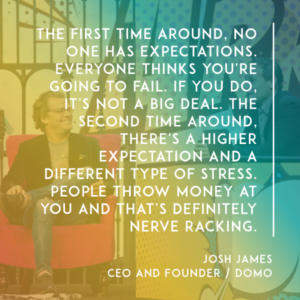
Josh: Yeah. It is. If you do, it’s not a big deal. You go to bat tomorrow. This time around, people have expectations. They throw money at you and that’s definitely nerve racking. The other big lesson or big difference is I figured, let’s go get those same people that we’ve worked with last time.
Jason: Getting the band back together.
Josh: Get the people that have been there, done that, and we’ll upgrade in other places and get more people that have been there, done that. And then you lose that wonderful thing that happens in a brand new startup with brand new founders, is everyone’s trying to make a name for themselves.
Everyone’s putting everything on the line. It’s all been there, done that, and it all ends at six, seven o’clock and there’s not the 11:30 text messages. We had to make sure we pulled some of those, generally speaking, younger people in and promoting them and making it their life and having that energy is extremely important.
Jason: There’s the energy and then also sometimes…everyone wants to get the band back together, right? It’s the easiest way to repeat lightning.
Josh: Sure.
Jason: But do you find that sometimes they only want to do things the way where they were successful? Is that an issue as well?
Josh: Yeah, and not only…
Jason: “That’s what we want to do. We know how to crush it one way,” and the world evolves.
Josh: Even with me, there’s things that I was sure were going to work the same way. There were some things I knew that we screwed up. I’m like, “We’ve got to improve those things.” You definitely shoot people in the head a lot faster, because you’ve learned that lesson a million times.
But there’s things like at Omniture, it was really easy to sell. [laughs] It’s like, “Do you have a website? OK, here. You need Web analytics.”
Domo is not as easy. People don’t understand. They’re like, “Well, it’s BI.” We’re like, “No, no, no, no.” They’re like, “It’s BI 2.0?” I’m like, “No, that’s kind of like ‘This sucks 2.0,’ because BI kind of sucked.”
It’s understanding how to be much more consultative in the selling process and turning the whole organization on that process is something we had to completely relearn, so that was different.
Jason: You need different DNA on the team, you think?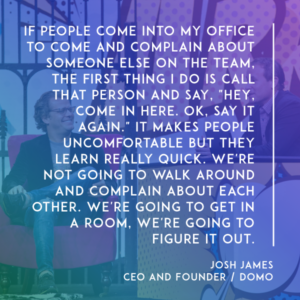
Josh: Some DNA difference, yes. I’m really comfortable…If people come into my office, which they often do to come and complain about someone else on the team, the first thing I do is call that person and say, “Hey, come in here. OK, say it again.”
It makes people uncomfortable, but they learn really quick, we’re not going to walk around and complain about each other. We’re going to get in a room, we’re going to figure it out. We’re going to fight, and we’re not going to make it personal.
But if you’re going to come in here and say something about somebody, that person’s going to be walking in here two minutes later. That’s what’s fun. Fighting and trying to make things win and beating the heck out of competition. That’s fun.
Jason: That’s fun, and then I want to dig into some of your meta lessons learned, but what else is different today than in the Omniture days? What’s different?
Josh: At Omniture, we were begging for money. It was my credit cards and my student loans. I have much better credit cards now. [laughs]
Jason: Did you have to IPO to raise money? Was the IPO actually a financing event?
Josh: Oh, yeah.
Jason: That’s real old school, isn’t it?
Josh: Yeah. It was $100,000 in credit cards and student loans. Basically, I got as many credit cards as I could, applied for them all at the same time, then ran them all for two days before anyone knew what happened.
[laughter]
Josh: This one, yeah, people were throwing money. On the one hand, it was nerve racking. I wasn’t sure if I wanted to do it. I was like, “It would be cool if I went public, and I owned 95 percent of it. That would be pretty awesome.”
Jason: It has a certain appeal.
Josh: It doesn’t work out that way. The interesting thing is, when we started bringing in investors, we started bringing in really smart investors. It gave us the extra pressure, which was good. Matt Cohler of Benchmark, he was our first VC in this one. He only had two questions. One of his questions was, “Why are you doing this again?”
Jason: Why are you doing it again?
Josh: I said, “I sold to Adobe and we left on OK terms. There was lawsuits afterwards, [laughs] so read into it how you will. Still friends with them all, but it pissed me off.” This is what I told Matt, I’m like, “I want to make Omniture look like that cute little thing we did when we were at elementary school.”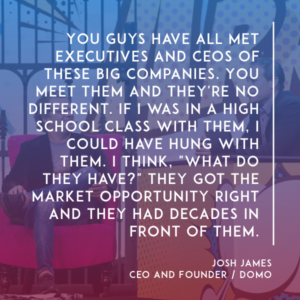
You guys have all met executives and CEOs of these big companies. I’ve met them all. You meet them and they’re no different. Then you look at the Michael Dells of the world and they’re all intelligent. They’re smart people, but they’re no different.
If I was in a high school class with them, in calculus or something, I could have hung with them. I think, “What do they have?” They got the market opportunity right. Then they had decades in front of them.
This time around, I wanna make sure that we can do it for decades and see how big of a company we can make.
Jason: Do it for decades. It has to be, in order of magnitude, better the next time, right? It’s got to be at least 10X bigger, doesn’t it?
Josh: That’s another thing. Yeah. I’ve told people that are like, “There is exactly zero percent chance this is going to be worth between 0 and $1.8 billion versus…” [crosstalk]
Jason: It’s not going to happen. [laughs]
Josh: There’s a zero percent chance. It might be 0, or it’s going to be more than 1.8. It’s not going to be in between.
We’re grateful for the opportunity, certainly. At the same time, that’s what the investors put the money in knowing. We’re going to swing big. If you can’t afford to lose money on this thing, don’t put it in, because we’re going to swing big.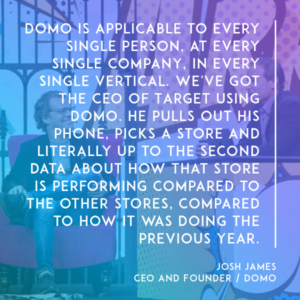
That’s what we’ve done with Domo. Domo is applicable to every single person, at every single company, in every single vertical. We’ve got the CEO of Target using Domo. He walks into any store. He pulls out his phone, picks a store and literally up to the second data about how that store is performing compared to the other stores, compared to how it was doing the previous year.
Got the CEO of UHG, Fortune number six, and the guy that runs analytics there told me, he said, “This is nirvana. I never thought this could happen in my life.”
I was talking to the CMO of another Fortune 5 company just a few days ago, he/she said because I don’t want to give it away, that it’s been his/her dream to show their CEO a real time dashboard of their business. She…dangit. She’s like, “You’ve done it right here. It’s already done. I can’t wait to show this.”
It’s really fun to see. This is a software as a service conference. Magic Number I got to invent with one of my VCs, and that’s the way we ran our business. There’s so many other metrics now to think about. Magic Number is really important, but retention is equally important. In revenue retention, Domo has 240 percent revenue retention of its customers.
Jason: That’s the magic, isn’t it?
Josh: This scene is going to be crazy. People still don’t know what we do. That’s OK. I’m totally fine with that. It’s about to get crazy up in here.
Jason: You got to be three to four years in until you feel the lift that you get from that, right?
Josh: Yeah, you do.
Jason: Do you have the NPS religion that I’ve grown to have the last couple years? Is that part of net negative churn?
Josh: The first couple years of Domo, the NPS was a depressing thing. We didn’t adopt it too greatly. Then, we…
Jason: When it was low in the beginning…
Josh: We figured things out about two years ago and got the product really cranking.
Jason: Drove it up?
Josh: Yeah. Now, it’s definitely a big part of what we’re doing. We use Qualtrics for that stuff. It’s been a really good…
Jason: Is it a core metric for you? Is it a core?
Josh: Absolutely.
Jason: In the beginning, because everyone wants to have a 70 NPS, but there are lot of reasons you might not start there. The most important thing is driving it up, over time, the most important thing.
Josh: At Omniture, we literally had 100 percent retention for the first six years of the company. We never lost a customer. It wasn’t revenue retention. We had 100 percent in nominal retention.
They go from that to then we start this new product. We’re like, “Hey, everyone’s going to like this.” No, there’s a million problems with it. That was really painful. Working through that, working through that, and finally getting that to where retention’s great now and customers are really happy, that’s a much better place to be.
Jason: In Omniture, when you had that, was it all because you had the special sauce figured out? Or was it because your market position and the importance of the problem Omniture solved in its time?
Josh: We got lucky in the architecture that we chose. We had a lot of competitors. Cloud was not accepted yet. If they were like, “Oh you’re cloud. Why the hell are your cost of goods sold so screwed up?”
We’re like, “Well, we have a hundred times the amount of data that Salesforce has. We have a lot more expenses.” People could not comprehend that. They’re like, “You guys don’t know how to run your technology.” We’re like, “What?”‘
The biggest thing we got right with Omniture was we couldn’t afford to buy, at the time, Sun Servers and Oracle Databases. We did MySQL. We did the LAMP stack because we had to.
That was by far the most efficient. We could scale up to…That’s why Walmart…There was a board member that was on the board of Walmart and on the board of Coremetrics, my competitor. We never thought we’d get Walmart.
Coremetrics goes down at Christmas. We get the phone call from Walmart. We get them as a customer because we scaled really, really well. We got that part right.
Jason: In Domo, you had that step function, where in the beginning you had to work it out. It’s stronger now.
Had any approach to customer success or being in the field with customers, if it’s evolved over time?
Josh: Yeah, that one, we’ve got right at Omniture. We 10X… we doubled down on that.
Jason: You double down on that early, right? That’s the trick, the second time.
Josh: Which is, any time I hear any customer that’s going to be problem…You talk to sales and marketing experts. They’re like, “You’ve got to find the target customer. You only get that target customer. If it’s not the target customer, you shouldn’t do it. You don’t want to be distracted, do all these things, and jump all over the place because the customers telling you then you’ll never have a strategy.”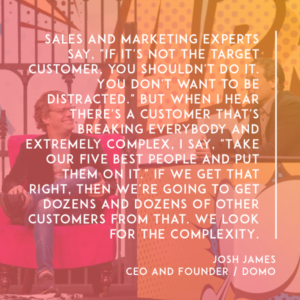
To a point, but when I hear there’s a customer that’s breaking everybody, that’s extremely complex, that says there’s no way we’re going to handle their business, I’m like, “Take our five best people, and put them on it. Let’s fix it. Let’s make it work.” If we get that right, then we’re going to get dozens and dozens of other customers from that one example.
We look for the complexity.
Jason: That’s my view. You have a big customer that comes in that wants to push the limits on deal size and everything. If it’s vaguely in your wheelhouse, you do it. You put a team on it, and learn from it.
Josh: Yeah, absolutely.
Jason: The advice of, “Those are outliers, and don’t get distracted,” is often terrible advice.
Josh: They can be distracting. You do…It’s a portfolio approach. There’s some customers that you end up spending half a million bucks on, and you don’t get anything out of it. Then the guy moves on, and you lose the contract.
It happens. If you think about you’re doing 10 of those, maybe three of them didn’t work out, but seven of them are going to be amazing. It’s going to be your long term business.
Jason: Let’s hit…I want to have some time. Let’s see if these are queued up for these slides because let’s find some fun stories out of it. Are these…? You guys got them?
Can you can go back one, I think, maybe or is this the first one? Roll back. Is this the first one? It’s all good. Let’s start with this one, even if it’s the second because I love this one because I was…
Go to…What’s your blog? What’s the URL? Everyone’s going to magically copy it.
Josh: Joshjames.com, you can…
[crosstalk]
Jason: I know how to get it in Google.
Josh: I’ve got 50 something startup rules there.
Jason: 50 startup rules.
Josh: It’s when we had no product at Domo. I was trying to make noise. We’d come up with startup rules.
Jason: Did it work as a content marketing strategy?
Josh: It did. Actually, yeah, it worked really well.
Jason: [laughs] This first one, it’s pretty obvious, but I want to think about it. This is your second time, sorry, recruiting. You can see right there.
“No good employee will walk through the door. Must recruit like you sell to the customers.” In the Utah, Salt Lake tech community, you’re fairly well known. I assume there’s a…
Josh: I’m big in Japan.
Jason: You’re big in Japan.
Josh: Not big in Utah.
Jason: What does this really mean to you today?
Josh: [Japanese] . I lived there for two years. I actually am big in Japan.
Jason: Recruiting is once you have traction’s all that really matters at the end of the day. Isn’t it?
Josh: It is, yeah. It’s, like it says, they don’t walk through the door. The best ones are always employed, and they’re happily employed.
Jason: Happily employed, right?
Josh: Recruiting’s a big deal. I’ve noticed over the years…I remember being in college and hearing about a guy that got recruited for Microsoft. He was so impressed. Even though, he had a business that was making him $200,000 a year.
Microsoft came and recruited him, rolled out the red carpet. Gave him a leather coat and a couple of laptops to give to his wife and himself. He couldn’t help but take the job. Then six months later, he quit, but he was so enamored with the process.
Jason: He did?
Josh: We try to do the same thing. An employee comes in, roll out the red carpet. Get them the drivers. Make sure you send stuff to their house to their spouse. Give them a bunch of gear, and make sure that they are treated really, really well. Everyone has the back on them.
An example of this, when I was recruiting my CFO, he was CFO at SuccessFactors. Every Software as a Service company wanted this guy.
Jason: He’s top three obvious list, right?
Josh: He is. He’s amazing. I called Lars, that ran SuccessFactors. I said, “How good is Bruce?” He said, “12.” I didn’t even finish my sentence, “12.” “OK, Lars. Got it.”
Jason: Thanks, done.
Josh: We’re recruiting him. Of course, he lets us know that he’s going to take his time because he’s cooking eight things at the same time. They were really hot startups.
We interviewed him, and then we lined up methodically with all of my board members, my investors, and my executives. I had 14 people on the list because he said he was going to make a decision on Sunday.
We took 16 hours, the whole day.
Jason: The whole team.
Josh: Including Bill Gurley, walking over to his house, and knocking on his door. Bruce is like, “Well, I have guests.” He’s like, “That’s fine.” Here comes Bill walking in your house and spending an hour with you.
It’s Bill. Of course, Bruce is going to be like, “Well, I can’t tell Bill to leave. I guess I’m going to spend an hour with Bill.” Methodically going through these things and acting like it’s a big deal you’re trying to win is extremely important.
We all know. You get the right person, and they make 10X the difference of the next person.
Jason: How much of your time do you spend recruiting these days?
Josh: How much do I spend recruiting?
Jason: Recruiting of your 80 hour work week.
Josh: I go through phases certainly. The last 12, 18 months, I’ve spent, I’d say, 25 to 33 percent of my time recruiting. Early on, I spent half of my time. I wanted to meet every engineer.
I was really protective of the culture, and then pulled back. “OK, I want to meet every manager.” Then, “OK, now I want to meet every director.” Now we have certain people that have to meet every director, every VP. Pull back as it goes.
Then personally recruiting makes a big difference on the VP level certainly…
[crosstalk]
Jason: A lot of first time founders, they’re crappy at recruiting. It’s not a skill they’re…
Josh: They’re crappy at recruiting.
Jason: They’re pretty bad at recruiting.
Josh: That’s a highly technical…
Jason: I don’t think we all naturally learn that in college?
[crosstalk]
Jason: What’s that?
Josh: Highly technical term, crappy.
Jason: It is. We’re bad at. I still struggle to get better at recruiting, right?
Josh: Yeah.
Jason: It’s a huge effort, if you have 15 people. Any great advice for a team to get better? What’s one big learning? I like having every single person on the team go all in, but what else?
Josh: I really like in recruiting saying something that’s going to throw them. I like when the guy that’s president of my company now that I hired to run sales at Omniture. They come in thinking they’re the big man on campus, and they walk around like that. You’ve got to make sure that they’re pitching you as well.
That’s the same thing with the VC. You go talk to VC. I don’t go in and just pitch. I go in and pitch. I’ve got three questions to ask including a couple of things that are going to make them uncomfortable.
Jason: Even with your CFO of SuccessFactors, you made him uncomfortable?
Josh: Absolutely.
Jason: Good.
Josh: I’m like, “I heard you’re an asshole. Talk to me about it.”
[laughter]
Jason: Not judging, just asking, right?
Josh: Just asking. That’s actually the exact same question that I asked to my president. I’m like, “You know, I’ve spent…I’ve interviewed you four different times, and it seems like you’ve got a little bit of asshole potential. I don’t know if you’ve gotten that feedback before or not, but talk to me about that.”
He tells me afterwards, he’s like spinning, “What did I do?” I want them to pitch me, too. I want to come across as a nice guy, and I want to make sure that they know that I’m going to take care of them, love them, and do everything I can to make sure that we go to the Promised Land together.
I want to make sure that they’re pitching me as well because, when you feel you can’t have something, you want it more. That’s an important part of pitching.
Jason: Your CFO and these others, did you lure them from [inaudible 19:48 DeBary??] to move to Utah?
Josh: Yeah, probably, maybe a third of the management team over the years. That’s the one thing we don’t have in Utah is Software as a Service CFOs. We don’t have a stable to choose from. You end up bringing in some executives like that in.
For us, if we can get them on a plane, we can close them and bring them in. For us, there’s a lot of companies here I know that aren’t based here in Silicon Valley. We call Utah Silicon Slopes. We make sure that the other…
We use the other CEOs in town to help recruit my CMO or my CFO, to make sure that they know everything else that’s going on in case they move there. Their kid’s going to high school. They don’t want to move away. They hate you. Are there other opportunities?
We do a lot of that. The other thing that we do is, because sometimes, and this happens in Utah, too, we’ll have Utah companies, and they won’t pick other Utah companies because we’re like, “Oh, it’s a Utah company. You can’t be as smart as people in Silicon Valley.” What? You kidding me?
That’s what they think. When we have people come in, we show them customer use case after customer use case after customer use case because GE, Target, Walmart, that says something that maybe you can’t say yourself.
Jason: I have a super strong opinion, but let’s say you’re in your position. You’re in Utah or anywhere. You’re in Bangalore. You find someone you think is decent first VP of sales, but they’re in the Bay Area. Does that ever work?
What do you think about that remote sort of…?
Josh: I hate remote employees.
Jason: It’s hard, right?
Josh: I hate it.
Jason: Not everyone will move, right?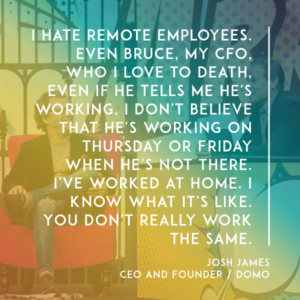
Josh: I hate all of it. I will only do it for just a few people. I will only do it for a few people that have done it before and proven that they can make it work.
Even my best ones, I still…Even Bruce, my CFO, who I love to death, even if he tells me he’s working, I don’t believe that he’s working on Thursday or Friday when he’s not there.
Jason: [laughs]
Josh: I just don’t.
Jason: You need to feel that collaboration vibe.
Josh: I’ve worked at home. I know what it’s like. You don’t really work the same.
Jason: I don’t know about…I don’t believe in working from home either. [laughs] That is a tough one.
Let’s talk about this one because I wanted to unpack this little one. I almost get it, but it’s pretty cool. “I only care about sales.” I get that.
“Don’t talk to me about marketing even, booth, HR, comp, legal lipping, and fix later with dollars.” This is about early stage debt. What debt can I have afford? Can I fix later with money in time, and what isn’t? Even marketing?
Josh: For me, this is all throughout. It’s so hard to get the whole company focused on sales. It’s really easy to get a good sales team. It’s easy to find people to support them, but to truly get everyone really focused on it.
Anytime someone comes and brings me something, depending on the phase that we’re at, but I’ve been through phases where I’ve said, “OK, if you’re going to bring me $100,000 spend, tell me why that $100,000 spend is better than a rep, because this is what a rep’s going to return to me,” every rep I get in here.
Because you’re like, “OK, we got to hire 10 reps,” and you think that cash flow will cost you a million and a half bucks before it starts paying itself off.
For some reason, the next million and a half dollars is not going to be 10 reps. You’re going to end up spending four million dollars because you’re doing all this other crap along with it.
If you want to spend $100,000, tell me why I should spend it on that instead of another rep. I don’t care, it’s legal. Why do I need to spend it on this extra patent person or this extra contract? Why can’t I hire another rep instead?
You’ve got to justify it. It’s for your own good. Help them understand that.
We did things. We were trying to win a customer back in the day. I got 4,000 little squishy balls, put the customer’s logo, and put them all over the office. Everyone’s throwing them at each other, but everyone’s sitting there staring at that customer logo name.
We were trying to close Walmart that one time. I gave everyone…It was probably stingy. It was probably 50 bucks, but it was 50 bucks.
Jason: Go spend it at Walmart.
Josh: When we got customer 100 here, I passed out $100 to everybody and get them really focused. At Domo, we were focused way too much on all the other things because we have all these people that have been there, done that, so they’re trying to put all the systems in place.
We put Kmart Blue Light Special, blue lights from all the ceilings everywhere. No matter which building it is, we close a deal, lights are going off. We’re playing music. Then everyone comes, and they’re complaining about, “I’m on a call” and then this music, because we let all the sales guys pick their own music.
“Welcome to the Jungle” starts playing, and you’re trying to do a pitch.
Jason: That’s gotten 2.0.
Josh: I’m like, “I don’t freaking care. You’re going to have to explain to the customer that a deal just closed.” We were only able to sustain that for about a year, but it really taught everyone how to think about things and how we think about things as a company.
Jason: As you add a team, it especially can be confusing especially if you’ve raised funding, that multiplier effect of each rep. The rep costs this. I need all this in marketing and all this other.
All of a sudden, the fully burdened cost is 3X the OT.
Josh: For every six reps, we’re going to have to hire another manager because there’s no way you could manage more than six people. I’m not really sure that’s true. I like pushing on that a lot.
I like having them screaming. I like when they come…This has happened to me. I like when six, seven reps come to my office at one time, and do a sit in, “We really would be more effective if we had another manager to help us out.”
I’m like, “OK, if we’ve reached that point, then. Until then, no, I’m not doing it.”
[laughter]
Jason: It’s tough. It’s good. This is actually the way people spend all the money.
Josh: It is.
Jason: They’re actually capital efficient for a certain point, and then sales efficiency tends to plummet somewhere whether it’s 10 or 20 million in revenue or it’s 10 or 20 million in fundraising. They bolt on all this… They’re not quite sure why they’re spending what they’re spending.
Josh: For sure.
Jason: Next one, I know this sounds simplistic, but this is an important one because incentives matter.
Josh: I freakin’ love this one.
Jason: You love this one.
Josh: I love this one.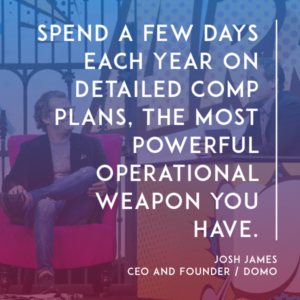
Jason: “Spend a few days each year on detailed comp plans, the most powerful operational weapon you can have.” One of the most popular things that I wrote in the early days was my hacky sales comp plan. It’s top of natural search engines.
What have you learned here? What can you share with us?
Josh: Definitely, I like sales plans, and then CFOs and other people come along, “This is too complex.” The lawyers get involved, “We’re not going to be able to be Sarbanes Oxley Compliant with all this stuff.”
I’m like, “You know what, figure it out. That’s what you’re paid to freaking do.” “Well, we can’t do things on a spreadsheet.” “Well, then go write some freaking software. I don’t really care.”
If it moves the dial, then I’m really interested in it. It goes beyond that. We were having trouble one time at Omniture where I literally had my CFO walk into my office in a panic. Shut the door. He’s like, “We can’t take any more deals. We can’t close any more deals. We need to stop.”
[laughter]
Josh: “Take a breath, bro, because that’s not the answer.” He’s like, “Well, we need to get more money. We can’t buy enough machines,” because AWS didn’t exist back then.
I’m like, “OK, we’ll get more money. We can figure that out.” He’s like, “Well, we need it now.” I’m like, “OK, well, let’s go get some more now.” He’s like, “And we can’t install them. They’re coming too fast. We can’t install them. It all comes at the end of the quarter. We can’t install them.”
That was a legitimate problem. We were having a hell of a time getting client services to do implementations. This guy that I had running it is extremely anal about making sure that he’s got the right people and will not budge on that.
I love when you know their limiting factor. The limiting factor is he’s not going to bring anybody other than quality. I went and gave him a really stupid incentive, “For every person you hire, uncapped, I’ll give you 1,000 bucks.” He hired 150 people.
[laughter]
Jason: It worked.
Josh: It worked.
Jason: It worked.
Josh: Every single one of them was good quality because he cannot live with himself if they’re not good quality. We had another problem.
We went public at Omniture. We had 55 percent gross margins. We knew we could get it higher, but we were keeping things on. I had tried so hard to get gross margin improved.
I went to my CTO, and he’s like, “Well, you know, if sales people wouldn’t sell under price, if they wouldn’t under price their deals, then we’d have better pricing. That’d lead to better gross margins.”
I’m like, “True,” but I don’t really…”If the network operations guys didn’t always feel like they need so much capacity, we’d be OK. They won’t push this.” I’m like, “You know what, Mr. CTO, I’m going to give you $50,000 for every percentage point that you increase.”
He’s like, “Well, that’s not really fair.” I’m like, “I know.” He became the czar, man. He’s like, “Well, I have to get involved in pricing.” I’m like, “You go right ahead. Get involved in pricing.”
He’s making every…He put all these stipulations in place so that he was able to get, and he made $600,000 that year on gross margin increase. The company, three years later, we made probably an extra $50 million in cash on that. It was a massive return, but it was just a comp plan.
Jason: I love it, too. You like incentives for as many folks as you can make it work across the company, right?
Josh: Yeah, last quarter, I paid my telesales guy and my enterprise sales guy, they both have about the same number of reps. I needed to have a big quarter. We’re getting ready to raise some money.
I said, “OK, John, Paul, all or nothing, 100,000 bucks, whoever sells more.” That’s all any of us heard about for the next three months. One of them won by about…It was about 60,000 bucks. It was $10 million deals. It was pretty funny.
Jason: That’s awesome. You talked about getting the gross margins up with your CTO. What about incentives for other folks in the team, engineering, marketing, customer success? Have you evolved anything with them?
Josh: Yeah, engineering’s really tricky. Those, I’m sure there’s some in here of your kind. You guys are motivated by different things.
Jason: We’re about 20 percent in product and engineering, but be careful.
Josh: You guys are motivated by different things. Which is OK. I love finding the engineers that are motivated by money. They’re not as many of them, but you find some of them. I love them.
Doing other really interesting things, whether it’s, “We’ll send you all to Disneyland if you get this thing done on time. Or we’ll rent out Star Wars, and you can invite your friends.”
[laughter]
Josh: We definitely get creative in that stuff. I love…It’s fun. It’s fun, and everyone’s accomplishing it together.
Jason: It is fun.
Josh: I love it. I love incentives.
Jason: You may not have one, but any good stories of missed incentives? Because it can go the other way, too, right? What you incent, you get.
Josh: You do. Salespeople are complete whores.
[laughter]
Josh: It’s just true. They are. I love them for it. Any way they can make a buck, they will. I’ve had my comp plans every single year.
This is funny. My CFO would get so mad. I remember he’d bring me in the office. He’s like, “I can’t believe you employ all these unethical people, and you’re OK with it.”
I’m like, “Take it easy, Mike. They’re just doing what we asked them. They found a loophole. Pay it.” He would close the loophole, sure enough.
There’s been tons of disincentives. There were misalignment in sales plans that I’ve created over the years, where you start paying for…Even paying a dollar whether it’s from a renewal or from an upsell. That’s the simplest one, upsell or a new contract.
If there’s a bunch of upsells to be had and they can hit their number, your new logo growth might shut down completely. Moving those dials, even if it’s midyear and saying, “Sorry.”
We just had a really embarrassing one. I’ll tell you guys. It was a horrible thing I cannot believe happened to me at this stage in my career, cannot believe happened to me, is we were struggling. We weren’t being efficient enough in getting new leads.
The marketing and finance, got marketing to spend a little bit less because the efficiency wasn’t there. Leads were coming down so the sales team wasn’t being fed.
Since the sales team wasn’t being fed, sales came down, which is not the real problem. The real problem is then, when your sales guys aren’t making quota, then they’re not making their dollars. They’re like rats on a ship. They’re the first ones off.
They start getting ready to run. I had four sales guys quit in the same week, four of my enterprise sales guys. I almost had a heart attack. I’m like, and they were smart ones, “If they leave, everyone here is going to know that there’s something wrong.”
Jason: Canary in the coal mine.
Josh: And I’m not going to have time to fix it. I went, and I’m like, “Here’s $100,000. Here’s $50,000. Here’s guaranteed comp next year.” I had to do it. I did it.
Then we’re like, “The rest of the sales team must feel the same.” We lowered quota for everybody. We brought quota down significantly by $150,000, which seems like, “OK, we’ll fix it again next year.”
I told the board, “We need these guys motivated. They’re not going to make the money anyway, but we need them motivated to get the accelerators.” They’re like, “OK.”
The idiocy that happened in my company that I’m responsible for, but you look at it and you’re like, “How did these smart people do this? How did I not catch this?” We built out our entire model to the new quota.
We generated leads to the lower quota. It was self fulfilling. All we did was completely shoot ourselves in the foot. We get a quarter and a half in, and we’re like, “What is going on? Why aren’t we selling what we used to be selling?”
“We don’t have the freaking leads.” “Well, why don’t we have the leads?” “We hit the model number.” “What’s the f’ing model number?” “Oh, it’s built to this quota.” “To the lower quota?”
It took us another six months to recover from that. Sometimes you have massive…That was entire company wide misalignment that we just recovered from two quarters ago.
Jason: Wow.
Josh: It’s embarrassing, but it happened.
Jason: It does happen to the very best of us is the learning. I want to get through all the slides, but we’re over. I want to hit one last thing. I want to go back to Domo.
Tell me one or two things for this year you’re excited about Domo. What’s going on that gets you jazzed?
Josh: Domo, by the time we’re done, is going to be tens of billions of dollars in revenue. It’s going to be one of the most significant software companies that’s ever been created. We got lucky.
I was frustrated that, as a CEO, I was not able to get my data. I didn’t realize that in order to get the CEO the data that means that all the VPs need to put the data in.
In order for the VPs to put the data in, their people have to put the data in and their people have to put the data. Next thing you know, you’ve got to build something that works for everybody in the company. We’ve done that.
We have customers that are Fortune 50 customers with every single employee in the company using our product, getting real time data, and saying things to me like, “I never thought that I was going to be able to see this, have this, or do this. I never thought this was possible.”
We had one of our managers. The guy, he bought $50,000 worth of Domo. Now it’s a several million dollar account. He’s been promoted four times in the last about 15 months.
He sent me a text last week, Fortune 50 company. He’s like, “Never thought I would be hanging out with the CEO,” and sent us a picture of the CEO getting on the corporate plane with him, getting on the plane right behind him.
He’s like, “My one complaint is Domo over WiFi on the corporate plane sucks.” I was like, “This is a good conversation to be having.”
We feel like the tipping point’s not here because people don’t know what we do. They still got to come and look for us. We still got to go out and evangelize.
We’re 100 million, growing 100 percent. It’s going to get crazy.
Jason: Crazy. Awesome.
Everyone give it up for Josh James. This was amazing.
Josh: Truly.

